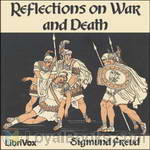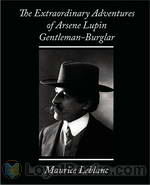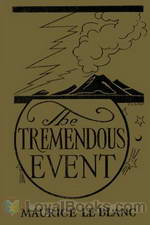|
Books Should Be Free Loyal Books Free Public Domain Audiobooks & eBook Downloads |
|
|
Books Should Be Free Loyal Books Free Public Domain Audiobooks & eBook Downloads |
|
Top Authors |
|---|
|
Book type:
Sort by:
|
By: Victor Appleton | |
|---|---|
 Tom Swift and His Big Tunnel
Tom Swift and His Big Tunnel
The Titus Brothers Contractors company have won a government contract in Peru to blast a tunnel through a mountain and connect two isolated railroad lines. The deadline is approaching, and the contractors have hit a literal wall: excessively hard rock which defies conventional blasting techniques. The company is under pressure to finish, or else the contract will default to their rivals, Blakeson & Grinder. Mr. Job Titus has heard of Tom Swift and Tom's giant cannon, which is used in protecting the Panama Canal, and wants to hire Tom to develop a special blasting powder to help them finish the excavation... | |
 Tom Swift in Captivity
Tom Swift in Captivity
Tom Swift is approached by Mr. Preston, the owner of a circus, and begins to tell the story of Jake Poddington, Mr. Preston's most skilled hunter. As it turns out, Jake went missing just after sending word to Preston that Jake was on the trail of a tribe of giants, somewhere in South Africa. That was the last Preston has heard of Jake Poddington. Preston would like Tom to use one of his airships to search for Poddington, and if possible, bring back a giant for the circus.Listeners are forewarned that some elements and characters included in Tom Swift books portray certain ethnic groups in a very dated manner that modern readers, and listeners, may find offensive... | |
By: Immanuel Kant (1724-1804) | |
|---|---|
 The Critique of Pure Reason
The Critique of Pure Reason
The Critique of Pure Reason, first published in 1781 with a second edition in 1787, has been called the most influential and important philosophical text of the modern age. Kant saw the Critique of Pure Reason as an attempt to bridge the gap between rationalism (there are significant ways in which our concepts and knowledge are gained independently of sense experience) and empiricism (sense experience is the ultimate source of all our concepts and knowledge) and, in particular, to counter the radical empiricism of David Hume (our beliefs are purely the result of accumulated habits, developed in response to accumulated sense experiences)... | |
 The Critique of Practical Reason
The Critique of Practical Reason
The Critique of Practical Reason (Kritik der praktischen Vernunft) is the second of Immanuel Kant’s three critiques, first published in 1788. It follows on from his Critique of Pure Reason and deals with his moral philosophy. The second Critique exercised a decisive influence over the subsequent development of the field of ethics and moral philosophy, becoming the principle reference point for ethical systems that focus on the rightness or wrongness of actions themselves, as opposed to the rightness or wrongness of the consequences of those actions... | |
 The Metaphysical Elements of Ethics
The Metaphysical Elements of Ethics
| |
By: Jean Webster (1876-1916) | |
|---|---|
 Daddy-Long-Legs
Daddy-Long-Legs
Jerusha Abbott, an eighteen year old orphan, faces an uncertain future in the charity home where she has lived all her life. On reaching adulthood, the orphanage can no longer offer shelter to its inmates. Her anxiety leads her into wild speculation when she is summoned to the matron's office. But a surprise awaits her. One of the visitors, a wealthy Trustee of the orphanage, has offered to fund Jerusha's college education and fulfill her dreams of becoming a writer. The only condition he makes is that he remain anonymous and that she write to him regularly about her progress... | |
 Dear Enemy
Dear Enemy
Dear Enemy is the sequel to Jean Webster’s novel Daddy-Long-Legs. The story as presented in a series of letters written by Sallie McBride, Judy Abbott’s college mate in Daddy-Long-Legs. Among the recipients of the letters are the president of the orphanage where Sallie is filling in until a new director can be installed, his wife (Judy Abbott of Daddy-Long-Legs), and the orphanage’s doctor (to whom Sallie addresses her letters: “Dear Enemy”). | |
 The Four-Pools Mystery
The Four-Pools Mystery
In The Four Pools Mystery the tyrannical plantation owner is deemed responsible for his own murder because of his mistreatment of the former slaves who continued in his employment after the war. Jean Webster (pseudonym for Alice Jane Chandler Webster) was born July 24, 1876 and died June 11, 1916. She was an American writer and author of many books including Daddy-Long-Legs and Dear Enemy. (Wiki) | |
 When Patty Went to College
When Patty Went to College
When Patty Went to College is Jean Webster's first novel, published in 1903. It is a humorous look at life in an all-girls college at the turn of the 20th century. Patty Wyatt, the protagonist of this story is a bright, fun loving, imperturbable girl who does not like to conform. The book describes her many escapades on campus during her senior year at college. Patty enjoys life on campus and uses her energies in playing pranks and for the entertainment of herself and her friends. An intelligent girl, she uses creative methods to study only as much as she feels necessary... | |
 Just Patty
Just Patty
Patty, Conny, and Priscilla are the best of friends, and roommates at boarding school. While the teachers might say they are mischievous, even troublemakers, Patty and her friends act only in accordance with their convictions. From forming a labor union to furnishing a house for the neighbors, Patty's ideas are unconventional, yet loads of fun. Just Patty is the prequel to When Patty Went to College, the first novel by the author of Daddy-Long-Legs and Dear Enemy. | |
 Jerry
Jerry
Jerry is the humorous story of a young man's attempt to win his lady. Jerry is waiting for his friends at a hotel in Italy, and is bored and lonely. When he hears that a beautiful American lady, Constance Wilder, is staying nearby, he tries to visit her. After an awkward first meeting, he tries to catch her attention by pretending to be a peasant tour guide. She recognizes him for what he is, but pretends not to, and a lively charade is carried on as they tease and fall in love. A clean, sweet, funny historical fiction/romance. | |
 Jerry Junior
Jerry Junior
| |
By: Ralph Waldo Emerson (1803-1882) | |
|---|---|
 Essays, First Series
Essays, First Series
“I do not wish to treat friendships daintily but with roughest courage. When they are real, they are not glass beads or frost-work but the solidest thing we know....” is how Ralph Waldo Emerson saw the ties of friendship in one of his essays titled Friendship, more than a hundred years ago. This and other interesting essays are included in Essays First Series by Ralph Waldo Emerson, the distinguished American philosopher and writer. Apart from writing, he was also a very gifted and popular public speaker who toured the length and breadth of the country sharing his ideas with the larger public... | |
 Nature
Nature
“Nature” is a short essay by Ralph Waldo Emerson published anonymously in 1836. It is in this essay that the foundation of transcendentalism is put forth, a belief system that espouses a non-traditional appreciation of nature. Recent advances in zoology, botany, and geology confirmed Emerson’s intuitions about the intricate relationships of nature at large. The publication of “Nature” is usually taken to be the watershed moment at which transcendentalism became a major cultural movement... | |
 Essays, Second Series
Essays, Second Series
Ralph Waldo Emerson (1803 – 1882) was an American essayist, philosopher, and poet, best remembered for leading the Transcendentalist movement of the mid 19th century. His teachings directly influenced the growing New Thought movement of the mid-1800s. | |
 Representative Men
Representative Men
A series of biographical lectures originally published in 1850. Each chapter is a philosophical treatment of the life of an intellectual. The six representatives are Plato, Swedenborg, Shakespeare, Montaigne, Napolean and Goethe. (Introduction by S. Kovalchik) | |
 Essays by Ralph Waldo Emerson
Essays by Ralph Waldo Emerson
| |
 Poems Household Edition
Poems Household Edition
| |
 May-Day and Other Pieces
May-Day and Other Pieces
| |
By: Sigmund Freud (1856-1939) | |
|---|---|
 Dream Psychology
Dream Psychology
From the dawn of human consciousness, dreams have always fascinated us. Do they mean something? Do dreams help us see into the future? These questions have intrigued us for centuries. Sigmund Freud was one of the first people to examine dreams seriously and interpret them in the context of our waking lives. In Dream Psychology: Psychoanalysis for Beginners, the Austrian psychoanalyst, Dr Sigmund Freud shares his exciting early discoveries that there was indeed a connection between his patients' dreams and their mental disturbances... | |
 Reflections on War and Death
Reflections on War and Death
Anyone, as Freud tells us in Reflections on War and Death, forced to react against his own impulses may be described as a hypocrite, whether he is conscious of it or not. One might even venture to assert—it is still Freud’s argument—that our contemporary civilisation favours this sort of hypocrisy and that there are more civilised hypocrites than truly cultured persons, and it is even a question whether a certain amount of hypocrisy is not indispensable to maintain civilisation. When this... | |
 Leonardo da Vinci A Psychosexual Study of an Infantile Reminiscence
Leonardo da Vinci A Psychosexual Study of an Infantile Reminiscence
| |
 Group Psychology and The Analysis of The Ego
Group Psychology and The Analysis of The Ego
| |
By: Maurice Leblanc (1864-1941) | |
|---|---|
 The Extraordinary Adventures of Arsène Lupin, Gentleman-Burglar
The Extraordinary Adventures of Arsène Lupin, Gentleman-Burglar
Two writers, famous in their own countries for creating immortal characters: Sir Arthur Conan Doyle in England and Maurice Leblanc in France. Their literary creations, Sherlock Holmes and Arsene Lupin are at two ends of the criminal spectrum. Holmes is a sleuth while Lupin is a burglar. When Maurice Leblanc introduces Sherlock Holmes in one of his Arsene Lupin stories, Conan Doyle is outraged. He sues Leblanc, who promptly changes the character's name to “Herlock Sholmes” and continues featuring... | |
 The Hollow Needle: Further Adventures of Arsène Lupin
The Hollow Needle: Further Adventures of Arsène Lupin
Arsène Lupin returns in a wonderful story of disguises, love, and of course treasure. Once again, Lupin crosses paths with the famous Holmlock Shears. But this time Arsène matches wits with Isidore Beautrelet, Sixth-form Schoolboy. Every step that Lupin takes has Beautrelet right on his heels. Has Lupin finally met his match? Will Beautrelet discover the secret of the Hollow Needle? And has the gentleman burglar met another match as well, one who will lead him away from his life of crime forever? | |
 The Eight Strokes of the Clock
The Eight Strokes of the Clock
The Eight Strokes of the Clock is a collection of eight short stories by Maurice Leblanc. The stories have his most famous creation, Arsène Lupin, gentleman-thief, as main character. The eight stories, even though independent, have a leading thread: Lupin, under the name of Serge Rénine, trying to conquer the heart of a young lady, travels with her, solving eight mysteries on the way. | |
 The Blonde Lady
The Blonde Lady
In “The Blonde Lady, being a record of the duel of wits between Arsène Lupin and the English detective” – original title “Arsène Lupin contre Herlock Sholmes” – the gentleman-burglar once more meets his enemy, the English detective Herlock Sholmes. If in the last story of “Arsène Lupin, gentleman-burglar” Sherlock Holmes arrives too late (the name was at a later date changed to Herlock Sholmes in reply to complaints and threats by Conan Doyle regarding copyrights), in the two stories that compose “The Blonde Lady” these two great intellects are bound in opposite directions... | |
 The Teeth of the Tiger
The Teeth of the Tiger
Maurice Leblanc delivers another Arsene Lupin adventure set in World War I. | |
 The Confessions of Arsene Lupin
The Confessions of Arsene Lupin
A collection of nine stories - or confessions - of the celebrated gentleman thief Arsene Lupin | |
 The Tremendous Event
The Tremendous Event
| |
 The Golden Triangle The Return of Arsène Lupin
The Golden Triangle The Return of Arsène Lupin
| |
 The Three Eyes
The Three Eyes
| |